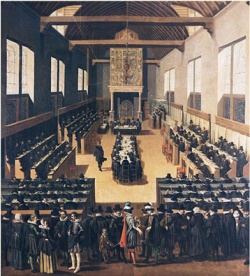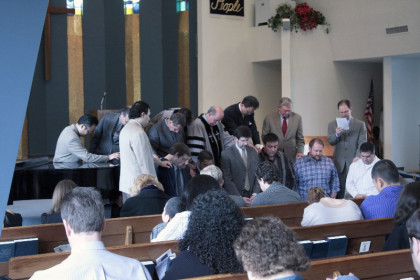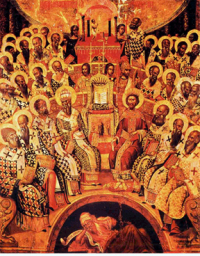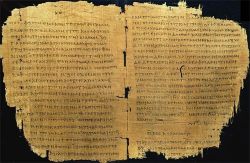 Article 7: God’s Freedom in Revealing the Gospel
Article 7: God’s Freedom in Revealing the Gospel
In the Old Testament, God revealed this secret of his will to a small number; in the New Testament (now without any distinction between peoples) he discloses it to a large number. The reason for this difference must not be ascribed to the greater worth of one nation over another, or to a better use of the light of nature, but to the free good pleasure and undeserved love of God. Therefore, those who receive so much grace, beyond and in spite of all they deserve, ought to acknowledge it with humble and thankful hearts; on the other hand, with the apostle they ought to adore (but certainly not inquisitively search into) the severity and justice of God's judgments on the others, who do not receive this grace.
______________________________________
While the Arminian champions the freedom of man, the Canons are clear that Christians must begin any discussion of God’s saving purposes where Scripture begins the discussion. This is not with the freedom of humanity, but with the freedom of God!
As we have seen throughout our discussion of prior articles, Scripture very clearly teaches that God has chosen to elect a vast multitude unto salvation based upon reasons known only to himself. Furthermore, God has also determined how he will call those to faith whom he has chosen—through the preaching of the gospel. This means he has ordained both ends (those whom he will save) and means (the preaching of the gospel).
In article 7, the Canons now make the point that God’s hidden decree (in eternity past) is carried out in time and space, of which the Scriptures are the divinely-inspired record. This means that God’s plan–otherwise hidden in the shadows of eternity–is revealed publically in ordinary human history as we see God bring to pass the very things that he has decreed would come to pass!
In terms of a logical order, of course, we must begin with God’s eternal decree. But when we view things historically in the Scriptures (i.e. as the things God has decreed unfold in redemptive history), we must begin where the Scriptures begin, which is not with what was hidden, but with the execution of that decree as it is revealed in the history of God’s people. This means that the Bible is both the explanatory record of God bringing to pass what he has decreed, as well as the history of the covenants (indeed, the covenant documents themselves!). Since Jesus is the elect one (i.e., that the one in whom God’s elect are chosen), Jesus is also the mediator of God’s gracious covenant. This means that redemptive history (the Bible) will be the record of Christ’s mediatorial work from beginning to end, and it will focus exclusively upon the unfolding drama of redemption.
The first point that is made in article seven is that God’s plan of redemption (i.e, the covenant of grace) was initially revealed “to a small number.” Beginning with promise of a redeemer made to Adam immediately after the Fall in Genesis 3:15, running on through the elect line of Abel, Seth, Noah, and so on, until we get to Abraham, slowly and over time God revealed the gospel in more detail to each of the successive generations. Jeremiah, who was one of the later prophets, prophesied the coming of a “new covenant.” Jeremiah certainly knew more about the coming redeemer than did Adam. This is why we must see the Bible as the record of this progressive unfolding of the one gospel of Jesus Christ described in article six.
The second point made in article seven is that this progressive revelation in the Old Testament finally culminates in the coming of Jesus Christ, when, in the fulness of time, the one mediator between God and man, formerly hidden deep within type and shadow, now enters center-stage of human history to accomplish those things necessary for our redemption (Galatians 4:4-6). Since Jesus Christ has stepped out of eternity past into human history, this means that “in the New Testament (now without any distinction between peoples”—such as Jew and Gentile) God now reveals the gospel to a large number of people, namely to all the nations and peoples of the earth.
The mission of Israel, which Calvin called the church in its infancy, was very narrowly focused. Israel was that chosen nation to provide God’s people with a savior and to preserve God’s word. But now that the Savior has been revealed, the gospel is now to go out to all the nations of the earth.
While in the Old testament the primary focus of redemption was limited to national Israel, in the New, the focus is now universal. It was our Lord Jesus who gave the great commission to his church in Matthew 28:18-20—“And Jesus came and said to them, `All authority in heaven and on earth has been given to me. Go therefore and make disciples of all nations, baptizing them in the name of the Father and of the Son and of the Holy Spirit, teaching them to observe all that I have commanded you. And behold, I am with you always, to the end of the age.” This indicates that it is the mission of Christ’s church to take the message of reconciliation to all the earth. The preached gospel is God the Holy Spirit’s means to call all of God’s elect to faith in Jesus Christ.
As the Canons go on to point out, God is perfectly free to decree whatsoever comes to pass according to his own pleasure and purpose. He is equally free to execute that decree in ordinary history as he sees fit. It is God’s will that he chose Israel to be the apple of his eye—it was certainly not because he foresaw Israel’s faithfulness and desire to do his will. Indeed, the Old Testament is in many ways the story of God’s faithfulness despite Israel’s repeated unbelief and unfaithfulness. God chose Israel not because of anything good he foresaw in his people. Rather, he chose Israel because it was his purpose to do so.
When we turn to the New Testament it is clear that it is God’s will that he chose a people in Christ from before the foundation of the world. In fact, he chooses a multitude so vast that no man can number them. This is why the authors go on to state “the reason for this difference must not be ascribed to the greater worth of one nation over another, or to a better use of the light of nature, but to the free good pleasure and undeserved love of God.” God will certainly bring what he has decreed to pass and accomplish his purposes and this means that history itself is God’s decree being executed in time and in space.
By now it should be clear that God does not simply set things in motion—as the Deists (and some Arminians contend)—and then steps back and watches things play out, and only then, does he elect some unto salvation based upon his foreknowledge of what his creatures will do when the gospel is preached to them. Those whom God foreknows will believe are then elected, while those who will not believe are not-elected.
However, this is nothing but a practical deism, in which God is bound to act based only upon what his creatures do. For many Arminians, man has free will, but God’s will is bound by the responses of his creatures. It is simply amazing that the Arminian system is based upon the myth of the human will’s freedom from bondage to human sin, while at the same time predicating that God’s will is in bondage to the “free” will of man.
This should once and for all remove any ground for human boasting. In the Old Testament, God chose Israel because of sovereign pleasure and purpose, while in the New Testament, we are told that God has chosen a multitude so vast the no one can count them, also based upon his pleasure and purpose. This is why the Canons conclude, “therefore, those who receive so much grace, beyond and in spite of all they deserve, ought to acknowledge it with humble and thankful hearts; on the other hand, with the apostle they ought to adore (but certainly not inquisitively search into) the severity and justice of God's judgments on the others, who do not receive this grace."
 Sunday, February 22, 2009 at 06:03PM
Sunday, February 22, 2009 at 06:03PM 
 Kim Riddlebarger
Kim Riddlebarger










